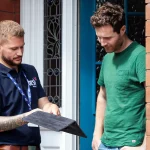Gigabit Broadband Still Top Digital Priority for UK Councils

Technical UK consultancy firm FarrPoint has today published their second annual (2024) survey of digital leaders at councils across England, Scotland and Wales. The results reveal that getting more areas covered by gigabit broadband is still the top priority for the second year running, while 5G divides opinion.
The report – FarrPoint Digital Connectivity Survey 2024 (PDF) – found that 47% of respondents chose gigabit broadband (1000Mbps+) as their number one priority, with another 30% as second. Getting 100% of their area covered by at least “super-fast” (30Mbps+) connectivity featured as the second-highest priority for councils.
However, the importance of 5G mobile continues to divide opinion. Even though respondents said 5G was important to them, none picked 5G as their top priority for 2024. Ensuring more areas covered by the older 4G service was also ranked as a higher priority than 5G on average, suggesting that the business case and additional benefits that 5G could potentially deliver have not yet been widely demonstrated.
Advertisement

On the upside, 51% of councils who responded said they now have an up-to-date digital connectivity strategy (up from 43% in Jan 2023), but around 11% still have no digital connectivity strategy at all and almost 30% don’t have a digital champion (i.e. somebody dedicated to tackle the problem and for engaging with network operators).

Elsewhere, local infrastructure deployment challenges – such as issues around street works, permits and inconsistent planning processes – overtook a lack of central government funding as the biggest perceived barrier to improved digital connectivity.
Advertisement
Speaking of which, it also appears that there remains a perceived lack of market interest in deployment, with this ranking third on the list of barriers to deployment for the second year in a row.

Next up, affordability is seen by councils as the biggest barrier to residential take-up of digital connectivity services, reflecting the ongoing cost-of-living crisis. But the growing increase in awareness of cheaper social tariffs for broadband and mobile, as well as generally cheaper and faster alternative full fibre networks, should help to tackle that.
Dr Andrew Muir, Chief Executive at FarrPoint, said:
“This is the second year of our connectivity research with local authority digital leaders, and it was interesting to see what’s changed – and what hasn’t – since our last report a year ago.
Some great progress has been made on digital connectivity within councils, but there are still areas for improvement. For example, it was clear from the responses that many local authorities are under significant financial pressure, which is, at times, leading to a reduced focus on supporting the digital connectivity rollout and take-up of services.
It was disappointing to see that local issues, such as the planning process and permits, were seen as this year’s biggest barrier to improving digital connectivity. I’d encourage councils to work together with other public bodies, central government and telecoms operators to tackle these challenges, because they are definitely surmountable.
During the ongoing cost-of-living crisis, councils could also be doing more to encourage take-up of improved connectivity services among their residents. There’s a widely held perception that these are unaffordable, but we’ve seen many cases where improved services are just as cheap, or even cheaper, than existing services.
I also hope to see a change in approach to net zero, to reflect the pivotal role that better connectivity can play in achieving the country’s environmental targets. Net zero isn’t someone else’s problem – digital departments can make a significant contribution.”
Finally, there has been a notable increase in awareness and preparedness for the various forthcoming connectivity service switch-offs. For example, only 2% of respondents had not started planning for the migration from copper to fibre broadband, compared to 27% last year. However, 21% were still to put plans in place for the 2G and 3G switch-off, which are already under way.
Advertisement
Mark is a professional technology writer, IT consultant and computer engineer from Dorset (England), he also founded ISPreview in 1999 and enjoys analysing the latest telecoms and broadband developments. Find me on X (Twitter), Mastodon, Facebook, BlueSky, Threads.net and Linkedin.
« UK Struggles in 2024 Country Ranking of Mobile Broadband Speeds






















































No one gives a poop about the netzero cult
Regarding councils it is unfortunate that many still posture that they have a “digital strategy” yet refuse to sign wayleaves for their housing stock
Given you feel the need to comment on any article here vaguely related you seem to care about it quite a bit.
It’s a shame we can’t see which councils voted for which options.
We’d then know if the ongoing digiphobic implimentations are the result of a lack of strategy or lack of direction and vote accordingly in the locals.
Exactly. I don’t think there’s any such strategy in Hampshire, which fares extremely poorly for both fibre broadband and 4G/5G.
Their excuse is that they can’t have a strategy due to their poor broadband connection. 🙂
The 2nd priority “Ensuring 100% of premises in the area have at least superfast connectivity.”
What does this mean?
OR’s Fibre checker for my premises on a maket town housing estate gives the following information.
Not yet available – Ultrafast Full Fibre Broadband Up to 1000Mbps
Available now – Standard Broadband Up to 24Mbps
Available now – Superfast Fibre Broadband 11-19 Mbps
Roll on 2024 technology.
This.
Even in the areas where “gigabit” fibre is available, often it will only have a maximum upload of 110 Mbps, which is a complete joke for anyone needing to do file intensive work from home.
Quite how the UK got to 2024 with the vast majority of the population having less connectivity than a 1990s ethernet cable, boggles the mind.
Neither operator here wants to do Direct In Ground properties. BT have skipped them all, and the other provider – who have been given the subsidy/contract for this area – have indicated they will not do them either.
Increasingly I’m being told that the rollout here is ‘complete’. Nobody wants to know about skipped properties. Nobody cares. There just isn’t money to do them, apparently.
Also been reliably informed the the absolute earliest that FTTC/’Superfast’ will be considered ‘not good enough’ by anyone is beyond 2030.
I guess that shouldn’t surprise me. There are still people struggling along on <10 Mb, in places. I don't think the UK cares about keeping up with our neighbours. Officials will say, 'We are the best in the world!' and it will be just as true as when Kim Jong Un tells it to his people.